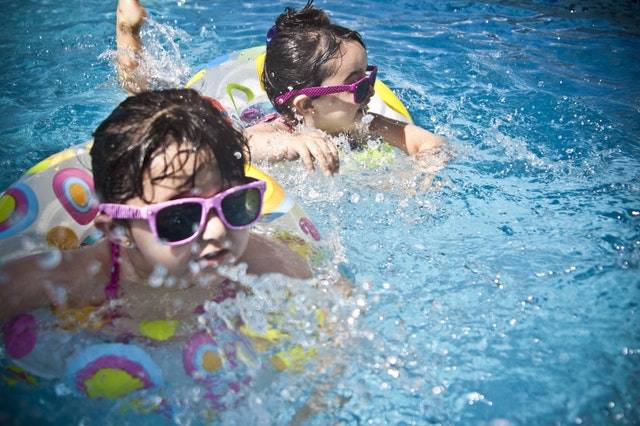The swimming pool is a place to relax, have fun and bond with the family. Swimming also offers remarkable health benefits (as long you know your pool safety) such as builds endurance, muscle strength, keeps heart and lungs healthy, etc.
Unfortunately, children in the pool can be exposed to risk such as drowning. Some people experienced even their worst nightmares in the pool. Instead of being the place for fun, it can turn to be the worst place in just a matter of seconds.
Owning a swimming pool is both a privilege and a responsibility. Beyond anything else, pool safety is so important. Appropriate precautionary measures should be practised to prevent potential pool dangers. Below are the 8 best useful tips to ensure that everyone is safe in and around the swimming pool.
How to protect children in the pool?
Never let children swim alone
Children are the most vulnerable person in the pool. Thus, they should not be left unattended.
Young children need constant care and supervision when they are in or near the water. Toddlers and infants should always be within arm’s reach of an adult. For older children, do not let them swim alone. They can also use “buddy system”.
Learn First Aid and CPR
It is a great advantage for parents, guardians, pool owners and kids to learn basic first aid and CPR. Learning first aid and CPR is a lifesaving skill that can help prevent and respond to emergencies in the pool such as drowning.
Learn how to swim
Learning how to swim is an important ability to survive in water. Moreover, it is also a life skill that can be useful to save others.
Although there is no evidence that swimming ability can reduce the risk of drowning, learning how to swim can boost a child’s confidence in the pool.
Watch out for hazards
Educate kids about the possible dangers of pool drain entrapment and teach them not to play near drains or any suction pipes.
Moreover, do not let children dive with their head first. The suction lines can catch their hair until they are drowning. Furthermore, make sure that there are drain covers to avoid unexpected accidents.
Always have proper hygiene in the pool
As a pool owner, it is necessary to practice proper pool hygiene to maintain personal health and to minimise the spread of bacteria that can cause others to be sick. Poor pool hygiene can result in serious health problems which include skin infections, respiratory diseases and eye infections. Here are proper hygiene practices to keep kids safe.
- Do not let kids swallow pool water. Ingesting pool water can result in stomach ache, diarrhoea and vomiting.
- Do not let sick people and those who have open wounds to enter the pool, especially if they have diarrhoea.
- Make sure to wash or shower before and after getting into the pool. This can help prevent the spread of germs and bacteria in the pool.
- Always wear a proper bathing suit.
How to make pool safe?
Keep swimming pool clean
A dirty pool can be a potential place where bacteria and other germs can grow exponentially. There are a few ways to keep the pool clean and safe to use.
- To avoid spills that can make the pool dirty, do not bring foods or drinks in the pool.
- For younger children, do not use disposable diapers. Instead, use swimming diaper since it is non-absorbent.
- Always have a regular maintenance check on your pool.
- Check the pool’s water balance regularly. Keeping the pH levels within the proper range (around 7.4 to 7.6) can avoid corrosion to the pool liner, handrail, pool pump and other pool equipment.
Consider installing pool safety gadgets
Children are most likely love to play games and do fun activities in the pool. Accidents like drowning are inevitable. Thus, there are a number of safety gadgets that can be set up to add layers of protection especially to kids.
Safety gadgets such as pool alarms, motion detectors, heat detectors and pool can make the pool a safer place for kids and for the rest of the family.
Install a compliant pool fence
Secure an appropriate and compliant pool fence around the pool. Children who drown in pools were out of sight for a short time. Thus, a pool barrier can help restrict kids from getting into the pool.
In NSW, there are certain pool compliance regulations to follow. Here are the basic pool fence requirements:
- A pool fence should be at least 1.2m in height from the ground level.
- The gap at the bottom of the pool fence should be no more than 10cm.
- There should be no gaps of more than 10cm between vertical bars.
- Horizontal climbable bars should be at least 90cm.
Conclusion
For pool owners and parents, it is your great responsibility to safeguard your kids and your family at all times. Pool dangers might come in an unexpected and unlikely time. Thus, the safety tips and precautionary measures discussed above can help you achieve a safe and secure pool, and indeed help you keep safe wherever you decide to swim.
To further ensure your pool is safe, you can reach out to a reliable private pool certifier. These experts conduct comprehensive pool safety and compliance inspection for your swimming pool. They also provide pool safety repair services if needed.

